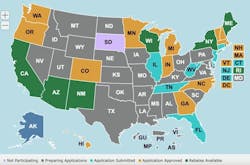HVAC Contractor Guide to IRA Awareness
As the HVAC industry makes progress with many changes that have taken place in 2024 and that are expected to continue through 2025, we offer another in our "What's New? What's Next?" series on HVAC manufacturer viewpoints. This month, we offer this commentary by Michelle Robb, Senior Director of Growth Excellence at Mitsubishi Electric Trane HVAC US (METUS). - ed.
Contracting Business: Michelle, over the last two years, how well has the IRA spurred heat pump awareness and adoption among consumers and contractors? What changes have you seen occur in the industry since the legislation was passed and incentives started to roll out?
Michelle Robb: The Inflation Reduction Act (IRA) has greatly increased heat pump awareness and adoption among homeowners and HVAC contractors. The push toward electrification is picking up speed, and governments are working to make the switch easier. Choosing an all-electric, all-climate heat pump system may come with federal incentives tax credits, and local utility rebates, depending on where someone lives.
The IRA’s $369 billion in clean energy provisions creates what Rewiring America calls an electric bank account for every household in the nation. The organization has a tool for homeowners to enter their household information to easily see if they are eligible for any of the programs. Similarly, Eli Technologies, a company based in San Francisco, lets consumers and contractors know which incentives they can apply for to electrify spaces.
Overall, heat pump sales across the United States are rising. In 2022 and 2023, the Air-Conditioning, Heating, & Refrigeration Institute (AHRI) reported that heat pumps outsold gas furnaces. In the first quarter of 2024, heat pump sales were already 30% higher than gas furnaces. In June 2024, 432,916 heat pumps shipped, compared to 379,895 units that shipped in June 2023 – an increase of more than 53,000 systems.
Mitsubishi Electric Trane HVAC US (METUS) is experiencing record sales, especially in the Northeast. We lead more than 50% of the heat pump market share in Maine, one of the coldest states in the country.
METUS recently surveyed U.S. homeowners to gauge their knowledge on the IRA and heat pumps, and we found that nearly two-thirds had heard of the IRA. The survey also found 54% of respondents would consider installing a heat pump to take advantage of a government incentive.
Today, two years after the IRA was signed, we know that more Americans are taking advantage of IRA-related savings.
CB: How have states been doing with their own rollout of rebate programs? What states are well-equipped for a successful rollout?
MR: It varies state to state. The map below, which changes daily, shows New York, Wisconsin, Arizona, and New Mexico have rolled out IRA Home Energy Rebates, but the rollout does not always include heat pump rebates. Other states are coming on board.
States must establish and maintain a qualified contractor list of which contractors can participate in the different IRA programs, such as these two programs:
- The Home Efficiency Rebates Program (also known as HER).
- The Home Electrification and Appliances Rebate Program (also known as the High-Efficiency Electric Home Rebate Act, or HEAR).
Each state will determine its own contractor criteria related to these rebate programs. Therefore, contractors may need training on heat pump installation and service and should sign up with state-specific energy offices/implementation providers with existing programs. Only program contractors can participate.
California provides a great example for rolling out heat pump incentives. Their rebates will be available through TECH Clean California, a statewide, pre-existing initiative to adopt clean space and water heating technology to create an equitable pathway to carbon-free homes by 2045 and install six million heat pumps by 2030.
According to the TECH Clean Energy website, as of Aug. 30, the program had 1,000 enrolled HVAC contractors, 40,000 installed units, and $90 million in paid incentives. This equates to greenhouse gas savings of 26,000 metric tons annually.
METUS has regular meetings with distributors and contractors in California to learn how they are implementing IRA incentives. We also educate them on its many benefits. California is rolling out the HEAR program in phases beginning with multifamily housing owners receiving up to a $14,000 maximum rebate per dwelling unit. We expect to see this expanded to single family, low-to-moderate income homes in the very near future.
Colorado is also making strides to incentivize heat pumps. According to CPR News, close to 66,000 Colorado households used tax credits for solar panels and other energy-efficient projects, including installing all-electric heat pump systems.
Colorado has applied and been approved for funding from the Home Energy Rebates program and the Home Electrification and Appliances Rebate program.
Some states are introducing limited IRA rebate programs, which gives them more time to develop the infrastructure needed to administer them effectively and ensure the programs are a success. Arizona, for instance, opened its IRA program for low- and moderate-income households that qualify for an emergency replacement. Heat pumps supplied through an air-conditioning replacement program will be offered in partnership with regional community action agencies to tackle heat relief emergencies and financial hardships. They are working to expand the program to all Arizona households later this year.
CB: How have METUS and the heat pump industry been educating consumers and contractors about the benefits?
MR: We are working to educate homeowners, contractors, and anyone in the HVAC industry about the benefits of heat pump installation.
METUS is also working to train contractors on new technology installations and equip them with the skills they need to meet new electrification demands from consumers.
My role at METUS is focused on educating consumers and HVAC contractors about the benefits of heat pumps and the resources available, like the IRA, to make installation a reality. My team and I create toolkits for contractors, which are designed to help them communicate the benefits of heat pumps and planned IRA incentives to consumers. METUS is also working to train contractors on new technology installations and equip them with the skills they need to meet new electrification demands from consumers.
METUS expects high demand for our high-efficiency, all-climate heat pumps. These solutions qualify for both ENERGY STAR and Consortium for Energy Efficiency standards, which are relevant to the IRA’s Home Energy Rebates and the 25C tax credit.
It’s worth mentioning that METUS became the first HVAC manufacturer to receive the Energy Skilled recognition from the Department of Energy (DOE) for its Residential Heat Pump Installation and Comfort Advising training program. The DOE’s training program supports the development of a robust U.S. building systems workforce.
METUS is committed to leading the charge to reduce fossil fuels in homes and commercial buildings. With the Energy Skilled designation, contractors who complete the METUS Residential Heat Pump Installation and Comfort Advising training program can feel confident in their vital role of helping Americans make home updates that increase their comfort while helping the environment.
CB: Over the next two years, how do you see heat pump awareness and adoption changing as more state rebate programs are rolled out?
MR: The U.S. must achieve 100% electric heating and cooling by 2050 to meet the IPCC's (Intergovernmental Panel on Climate Change) target of achieving net zero carbon emissions. According to Rewiring America, to meet this goal, electric heat pump sales must triple the 2023 baseline by 2032. Specifically, 4.49 million additional electric heat pump sales need to occur in the next three years – from now through 2026 – to meet this 2050 goal.
METUS projects a total market demand of 37.5 million heat pump units between 2022 and 2030, an increase we primarily attribute to the IRA.
These figures are reachable. Heat pumps are now considered a critical eco-friendly technology because they run efficiently on electricity and can be 100% powered by clean and renewable energy. As the IRA program matures and more information and statistics are revealed regarding incentives, the rollout strategy will change and improve. In the end, adoption across the United States will continue to increase.
CB: What are the three most important points that contractors should take away from this IRA Q&A?
MR: First, contractors need to get involved in the electrification movement because it’s only gaining momentum.
Second, they need to get trained to install and service all-electric, all-climate heat pump technology. We have plenty of programs to help contractors, including the Diamond Contractor® and Ductless Pro programs. HVAC contractors going through this program are in the driver’s seat because they participate in our multi-stage, in-depth training that ensures they are kept up-to-date on equipment, new industry technologies, and installation best practices.
Lastly, they should rely on manufacturers like METUS to keep them up-to-date on the latest IRA happenings in each state. We are working behind the scenes with so many organizations and other state-specific programs to help them understand METUS’s involvement in the clean energy movement. We are constantly aiming to keep contactors in the loop. CB
Michelle Robb is Senior Director of Growth Excellence at Mitsubishi Electric Trane HVAC US (METUS).
About the Author
Terry McIver
Content Director - CB
As director of content for Contracting Business, he produces daily content and feature articles for CB's 38,000 print subscribers and many more Internet visitors. He has written hundreds, if not two or three, pieces of news, features and contractor profile articles for CB's audience of quality HVACR contractors. He can also be found covering HVACR industry events or visiting with manufacturers and contractors. He also has significant experience in trade show planning.
Michelle Robb
Senior Director of Growth Excellence at Mitsubishi Electric Trane HVAC US (METUS)
Michelle Robb is Senior Director of Growth Excellence at Mitsubishi Electric Trane HVAC US (METUS).


